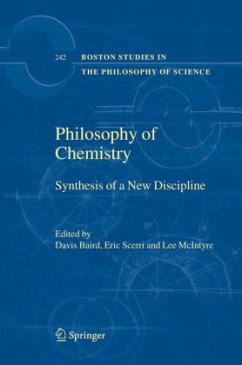The Invisibility of Chemistry DAVIS BAIRD South Carolina Honors College, University of South Carolina ERIC SCERRI Department of Chemistry and Biochemistry, University of California, Los Angeles LEE MCINTYRE Center for Philosophy and History of Science, Boston University BUTWHATAREALLTHOSECHEMISTSDOING? Recently, one of us (Davis Baird) attended a meeting of historians of science and technology spanning all of the natural sciences and engineering and all (western) periods, ancient through contemporary. In the discussion of a paper on state-of-t- art history of modern (18th century forward) chemistry, a member of the audience made the claim that there was very little left to do in contemporary chemistry and that chemistry departments in his country were having trouble attracting graduate students. Baird found this perspective on contemporary chemistry both remarkable andimplausible,andsaidasmuch. AttheUniversityofSouthCarolina(USC)-where he teaches-chemistry enrolls, and graduates,?ve times as many graduate students as physics. In this, USC is not unique. The discipline of chemistry is, in fact, enormous and enormously productive. Joachim Schummer in this volume (Chapter 2) makes the point persuasively and concisely with data on the number of publications in various ?elds. With a grand total just shy of 900,000 papers indexed in chemical abstracts for the year 2000, chemistry is larger than all of the other natural sciences combined.
From the reviews:
"This seems to indicate that the philosophy of chemistry is still in the process of synthesis, rather than a stable product of disciplinary consensus. ... There is material here of interest not just to philosophers, but also those with interests in history and philosophy of science and indeed the study of science and technology more broadly. ... for those who are curious, this volume would be a very good place to start seeking illumination." (Grant Fisher, Metascience, Vol. 16, 2007)
"Chapters in this book ... discuss chemistry's historical development; its relations to other sciences; its approaches to explanation, representation, classification, and measurement; and the ways in which issues in chemistry connect with, and shed light upon, larger philosophical questions about how sciences help us make sense of the world we live in. ... the philosophical questions, and their clear, careful, and engaging presentation in this book, will be of genuine interest to chemists ... . the essays in this volume will be a welcome resource." (Janet D. Stemwedel, Journal of Chemical Education, Vol. 83 (8), August, 2006)
"This collection of 19 papers is the result of a conference organized by the International Society for the Philosophy of Chemistry (ISPC) held in 1999. It ... will be read as, a landmark in the history of the philosophy of science. ... This volume testifies that ... chemistry has a philosophy of its own." (Bernadette Bensaude-Vincent, Nuncius, Vol. XXI (2), 2006)
"This seems to indicate that the philosophy of chemistry is still in the process of synthesis, rather than a stable product of disciplinary consensus. ... There is material here of interest not just to philosophers, but also those with interests in history and philosophy of science and indeed the study of science and technology more broadly. ... for those who are curious, this volume would be a very good place to start seeking illumination." (Grant Fisher, Metascience, Vol. 16, 2007)
"Chapters in this book ... discuss chemistry's historical development; its relations to other sciences; its approaches to explanation, representation, classification, and measurement; and the ways in which issues in chemistry connect with, and shed light upon, larger philosophical questions about how sciences help us make sense of the world we live in. ... the philosophical questions, and their clear, careful, and engaging presentation in this book, will be of genuine interest to chemists ... . the essays in this volume will be a welcome resource." (Janet D. Stemwedel, Journal of Chemical Education, Vol. 83 (8), August, 2006)
"This collection of 19 papers is the result of a conference organized by the International Society for the Philosophy of Chemistry (ISPC) held in 1999. It ... will be read as, a landmark in the history of the philosophy of science. ... This volume testifies that ... chemistry has a philosophy of its own." (Bernadette Bensaude-Vincent, Nuncius, Vol. XXI (2), 2006)








